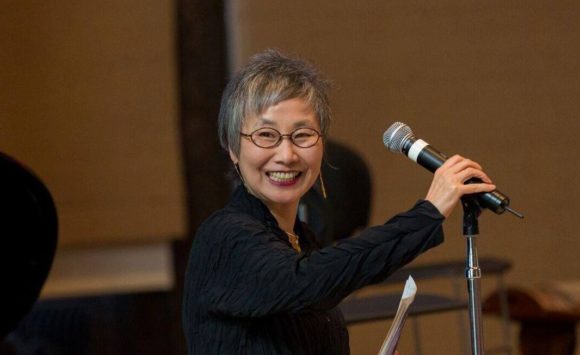
Biography
“Then came the great revelation of the festival: two coruscating works by Hyo-shin Na. …an elegant yet unnerving meditation for piano”…The Wire
After studying piano and composition in her native Korea, Hyo-shin Na came to the U.S. in 1983 to do graduate work at the Manhattan School of Music and the University of Colorado, where she received her doctorate. After moving to San Francisco in 1988, she met Cage, Rzewski, Wolff and Takahashi, and encountered the music of Nancarrow. At the same time, she made return trips to Korea to hear and study traditional Korean music while also taking a broad interest in the music of other regions of Asia.
Hyo-shin Na has written for western instruments, for traditional Korean instruments and has written music that combines western and Asian (Korean and Japanese) instruments and ways of playing. Her music for traditional Korean instruments is recognized by both composers and performers in Korea (particularly by the younger generation) as being uniquely innovative. Her writing for combinations of western and eastern instruments is unusual in its refusal to compromise the integrity of differing sounds and ideas; she prefers to let them interact, coexist and conflict in the music.
In Korea, she has twice been awarded the Korean National Composers Prize, and in the west she has been commissioned by the Fromm and Koussevitzky Foundations among many others. Her music has been played worldwide by ensembles as varied as the Barton Workshop, the San Francisco Contemporary Music Players, the Kronos Quartet, and the Korean Traditional Orchestra of the National Theatre. Portrait concerts, consisting solely of her music, have been presented in Amsterdam by the Barton Workshop (2006), in Seoul by JeonGaAkHoe (2009) and Buam Arts (2009), at Texas A&M University (2007) and in San Francisco and Santa Cruz, California by New Music Works in 2012. She is now working on pieces commissioned by the Daegu New Music Festival for a June, 2014 premiere and for the San Jose Chamber Orchestra for the 2015-16 concert season.
She is the author of the bilingual book Conversations with Kayageum Master Byung-ki Hwang (Pulbit Press, 2001). Her music has been recorded on the Fontec (Japan), Top Arts (Korea),Seoul (Korea) and New World Records (US) labels and has been published in Korea and Australia. Since 2006 her music has been published exclusively by Lantro Music (Belgium).
Works for Japanese musical instruments
- Cloud Study
haeguem and bass koto (2017) - Cloud Study II
violin and bass koto (2017) - A Little Winter Flower
koto, violin, and double bass (2017) - Koto, Bass Koto II (2017)
- Koto, Piano II (2016)
- Koto, Bass Koto (2016)
- Koto, Violin
violin and bass koto (2016) - Fukujuso
3 kotos, cello, and bass koto (2015) - Koto, Piano (2014)
- The Sky Was Beyond Description
one player on koto and bass koto (2014) - Go on Listening
kayageum and bass koto (2014) - Koto, Bass, Piano (2014)
- A Little Winter Flower
mixed choir with koto, double bass, and piano (2013) - A Little Winter Flower
mixed choir with violin, koto, double bass (2013) - Violin, Koto, Bass (2013)
- That Old Woman
bass koto and 25 st kayageum (2013) - Five Pieces on Yoshie Hikage’s Poems
koto solo (2013) - For the Adonis
koto solo (2013) - For the Wild Chrysanthemum
koto solo (2013) - Fukushima Refugees
koto solo (2012) - No More!
koto solo (2012) - Missing You Husband
koto solo (2012) - Echoes of Harmonious Music
koto and kayageum (2012) - Music for 25 String Koto (2012)
- Chrysanthemum Song
koto and 25 string kayageum (2012) - Night Procession of the Hundred Demons
koto solo (2011) - Koto Music
koto solo (2011) - Crazy Horse
Korean Traditional Orchestra with koto solo (2011) - Night Procession of the Hundred Demons
koto solo (2010) - Koto Ninano
3 kotos (2010) - Song of One Lost in the Fog
flute/alto flute, clarinet, violin, viola, cello, and piano with koto solo (2009) - Night Procession of the Hundred Demons
3 kotos (2009) - Night Procession of the HundredᅠDemons
3 bass kotos or any multiple of 3 bass kotos (2008) - arrangement of Jindo Arirang
piri, shamisen, koto, and changgo (2004) - arrangement of Soran-bushi
piri, shamisen, koto, and changgo (2004) - Song of Disillusionment
shamisen and koto/bass koto (2004) - Music to be Forgotten
shamisen solo (2004) - A Woman Was Named
shamisen solo (2002)
